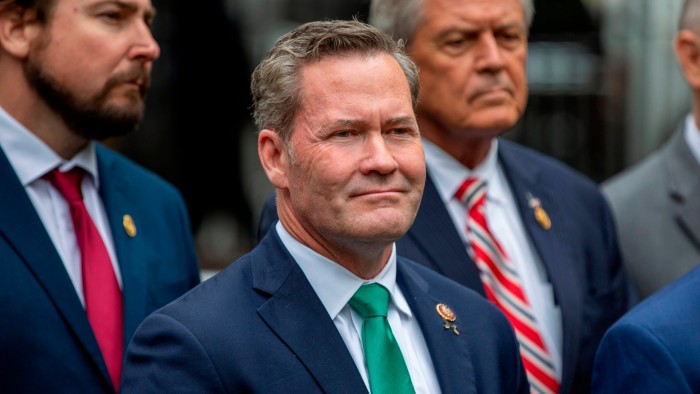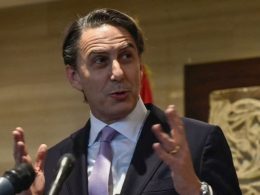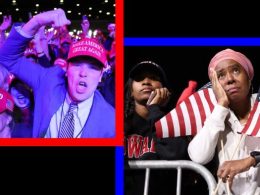Donald Trump has signalled a tough new stance on China with hawkish appointments to top foreign policy roles, according to experts in Washington, as the president-elect races to fill his most important cabinet roles.
Trump on Tuesday named Mike Waltz, a Florida congressman and former Green Beret who has called China an “existential” threat, as his security adviser. He is expected to nominate Senator Marco Rubio, another leading China hawk, as his secretary of state.
The president-elect’s pick for ambassador to the UN, representative Elise Stefanik, has also been extremely critical of Beijing.
Foreign policy experts who believe the US should take a tougher line on China than that pursued by Democratic President Joe Biden welcomed the personnel moves.
“This is like Christmas morning for China hawks,” said Eric Sayers, managing director at the Beacon Global Strategies consultancy.
Sayers said Trump’s appointees understood not just the US’s need for robust defence but also the importance of competition with China in other areas, including the economy, technology and human rights.
Mike Gallagher, the former Republican Congress member who headed the House China committee, said the appointments of Waltz and Rubio should send a message to Beijing that “the era of accommodation is over”.
“Waltz and Rubio see the Chinese Communist party threat clearly, understand we are in the early stages of a new cold war and [understand] that in order to win it we need to restore deterrence and prioritise hard power,” said Gallagher, who nows heads tech group Palantir’s defence business and is a fellow at the Hudson Institute think-tank.
Waltz has urged the US to boost its deterrence against China. “We have to shift to the Pacific,” Waltz told the Financial Times in September, saying the situation was “dire” as China pursued the “most rapid military build-up since the 1930s”.
Trump on Tuesday said Waltz would be a champion of “peace through strength”, borrowing a phrase used by former president Ronald Reagan.
Dennis Wilder, a former CIA China expert, said Trump and his emerging team believed the Biden administration had not made clear to Beijing that “US primacy in the Indo-Pacific was unshakeable and that war with China can only be avoided by a strong deterrent and resolve”.
Waltz told the FT in September that Trump would prevent a conflict over Taiwan by demonstrating US strength.
“He truly believes that we can apply leverage, we can apply our economic strength, that we can apply diplomacy in a way backed by a robust military presence that can prevent these wars,” Waltz said.
Defence experts have scrutinised Trump’s appointments for a sense of his thinking on Taiwan, the most sensitive issue in US-China relations. Waltz said he expected Trump would continue the US policy of “strategic ambiguity” under which the US does not make clear whether it would come to the defence of the island.
“I don’t think he wants Xi to know,” Waltz said, referring to Chinese President Xi Jinping.
Waltz will have an ideological ally at the state department in Rubio, experts said. The Florida senator was among the earliest proponents in Congress for a tougher approach on China, over everything from its persecution of Uyghurs in Xinjiang and its crackdown on democracy activists in Hong Kong to its pressure on Taiwan. In 2020, China included Rubio on a list of sanctioned Americans over his “egregious” record on Hong Kong.
Alexander Gray, who served as National Security Council chief of staff in the first Trump administration, said the selections showed that Trump wanted “to surround himself with strategic thinkers who understand the challenge posed by the People’s Republic of China”.
But Gray said Waltz would be an “honest broker”, mediating debates in the inter-agency process rather than trying to impose his own positions instead of the president’s.
Rush Doshi, a China expert at the Council on Foreign Relations and Georgetown University, said Trump had two China policies in his first term: One was a “competitive” policy pushed by his staff and the other was his own “transactional” policy that undermined competitive moves on technology, trade and human rights to secure deals with China.
In that sense, foreign policy experts are watching closely to see what role Trump’s ally Elon Musk will play — and whether the billionaire would seek to temper Trump on China because of his ties to the country where he has a Tesla factory.
“Picks like Rubio, Waltz and Stefanik suggest there’s going to be a group pushing the tough approach rather than the transactional one. That could mean greater continuity with the Biden team on allies, human rights, technology and Taiwan,” said Doshi.
“But as we saw last time, personnel only goes so far. Trump is in charge and doesn’t hesitate to push out those who disagree with him.”
Source link









